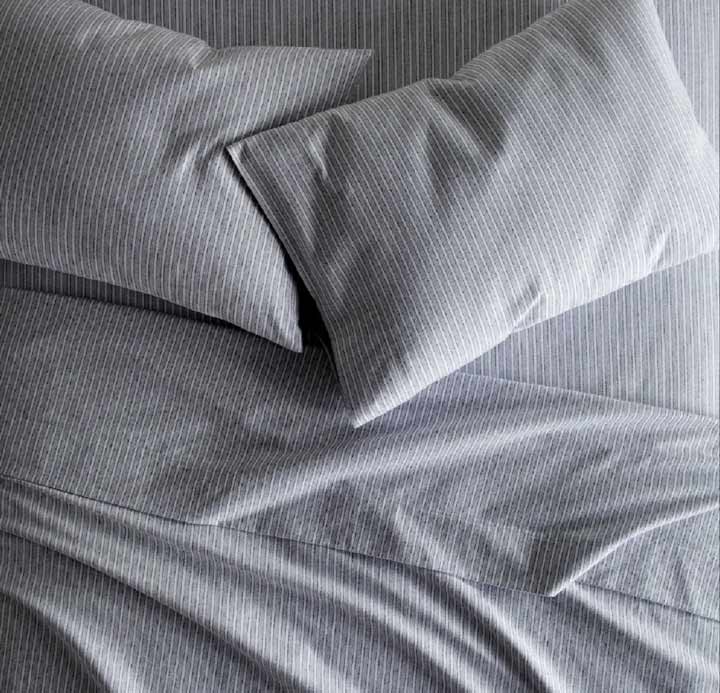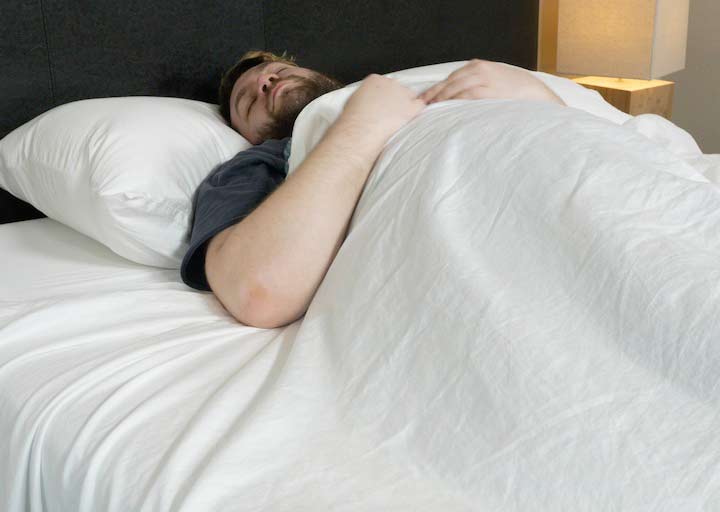When was the last time you invested in a new set of sheets? Find out how long sheets are supposed to last and what you can do to make sure you get the longest possible life-span before it’s time to buy new sheets.
How Long Do Sheets Typically Last?
There are multiple factors that can determine how long your sheets last, from material type to how your sheets are cared for. In general, sheets should be replaced every two to three years or every 100 washes. While the two to three year mark is a good rule of thumb, here are a few factors that can impact the life-span of your sheets.

Sheet Materials
There is no single best material for sheets. The best quality sheet material is one that will feel comfortable and meet your personal preferences, whether that’s a crisp percale or a luminous, soft sateen.
The most popular sheet materials include:
- Cotton sheets: Cotton is breathable, durable, lightweight and one of the most commonly used sheet materials. Cotton sheets can be affordable and comfortable and are available in various thread counts. Cotton sheets typically last two to three years.
- Percale sheets: Percale is a tight-knit cotton fabric with a light and airy feel. Percale sheets tend to get softer with every wash and are comfortable in all seasons. Percale gives sheets that crisp “hotel bed” feel. Percale sheets tend to be long-lasting. Percale sheets typically last around three years.
- Sateen sheets: Sateen refers to a weave pattern, not a specific material. The sateen weave results in a sheet that has a luxurious, shiny side to the sheets. You get a silky look and feel that’s still breathable. Sateen sheets typically last around three years.
- Linen sheets: Linen is an all-natural, extremely breathable and comfortable material, especially if you tend to sleep hot. Linen can get a bit “wrinkly,” but its breathability and moisture-wicking properties are a fair trade-off. Linen sheets generally last longer than other materials, providing three to five years of use if maintained properly.
Thread Count
Thread count can sometimes be an indicator of a sheet’s quality. Manufacturers determine thread count by adding up the vertical and horizontal thread wefts in a square inch of fabric. The more thread density in that square inch, the higher the thread count.
While thread count can sometimes be an indicator of a sheet’s quality, higher thread counts don’t always mean a better quality or more comfortable sheet. Breathable fabrics, such as percale and linen, are usually more comfortable with a lower thread count. Higher thread counts can prevent airflow and result in sleeping hot.
- Good quality percale sheets typically have a thread count between 200 – 500.
- Good quality sateen sheets have a desired thread count between 300 – 600.
Higher thread counts can sometimes be more durable and extend the life of your sheets, but it’s not as much of a factor as the thread materials.

Factors Affecting the Life-Span of Sheets
Materials, weave pattern and thread count can only go so far in predicting how long your sheets will last. The biggest indicator of your sheets’ longevity is how you use and care for your bedding. Here are a few of the factors that can affect the life-span of your sheets.
Frequency of Use
Are your sheets used daily, or are they sitting on a guest bed that only gets used a few times a year? The more you use and wash your sheets, the faster they can wear out.
Sweat and Body Oils
Moisture (sweat) and oils can speed up the deterioration of your bedding. If you live in a hot climate, sleep hot or have a medical condition that causes you to sweat more, your sheets will need to be washed more frequently and may wear down faster.
Oils from your skin and hair can stain your favorite sheet set, as can cosmetics and personal hygiene products, such as lotions, skin care products, and aluminum-containing deodorants. The more sweat and body oils your sheets absorb, the shorter their life span.
Pets
There’s nothing sweeter than cuddling up to your furry friends for a good night’s sleep. That is, until you consider all the unsavory additions your pet brings to your bed sheets. Paws can track in dirt from the yard or litter from the litter box, as well as trace amounts of fecal matter. Pet dander, allergens, hair, parasites, insects and even bacteria can also join you in the sheets when your pet sleeps in bed with you. Your pets’ claws may cause pilling or tears in your sheets and bedding, as well.
Welcoming your pet into your bed is a personal choice, but if you do, make sure you’re washing your sheets and bedding regularly and replacing your sheets often.
Tips to Make Your Sheets Last Longer
How do you maximize the life-span of your favorite sheets and hold on to them as long as possible? Prioritizing proper sheet cleaning and maintenance can help you make sure your sheets enjoy a long, well-cared-for life.
Proper Washing and Storing Techniques
Understanding how to wash bed sheets properly is the first step to prolong the life of your sheets. When you wash your sheets regularly and properly, you’ll remove the sweat, body oils, cosmetics and everything else you (and your pet) may have tracked into your bed. Regularly laundering your sheets can also help make them softer and more comfortable.
When it comes to knowing how to wash your bed sheets, reading the care label is key. Your sheet set will come with the manufacturer’s recommendations for how to wash your sheets, which may include washing in cold water, using gentle detergent and drying with low heat.
Once your sheets are cleaned and dried, put them back on your bed or store them properly. Keep them in a cool, dry place where they are safe from moths and sunlight, which can cause fading.

How often should you wash your sheets? Again, the amount of use your sheets get will help you determine how regularly they get washed. If you are using your sheets daily, wash them once a week. If you sweat heavily, invite your pets into your bed, or sleep naked, you may consider washing them more frequently.
For guest bed sheets that are only used for visitors, you can get away with washing/ replacing them before your guests arrive.
Rotate Multiple Sheets Sets
If your favorite pair of sheets is getting daily use on your bed, consider buying a second or even third set to rotate sheet sets, decrease their usage and prolong their life-span.
When to Get New Bed Sheets
Do you need to replace your sheets? If you can’t remember when you purchased your current set, here are a few signs that it’s time for a new set:
5 Signs it’s Time to Replace Your Sheets
- Your sheets are damaged or uncomfortable
- Your sheets are stained, pilled or have holes
- You see obvious signs of aging, such as fading or fraying
- You notice yellowing
- Your sheets smell unpleasant, even fresh from the wash
How Often to Replace Sheets?
Choosing a long-lasting, quality sheet material and properly washing and maintaining your sheets can help them live a nice long life. Rotating them out so they get a break from daily use can help them live even longer. But remember that most sheets have a life expectancy of two to three years, and your sheets should be replaced once they show signs of aging, staining, or wear and tear.

